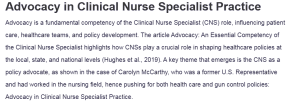Advocacy in Clinical Nurse Specialist Practice
Advocacy is a fundamental competency of the Clinical Nurse Specialist (CNS) role, influencing patient care, healthcare teams, and policy development. The article Advocacy: An Essential Competency of the Clinical Nurse Specialist highlights how CNSs play a crucial role in shaping healthcare policies at the local, state, and national levels (Hughes et al., 2019). A key theme that emerges is the CNS as a policy advocate, as shown in the case of Carolyn McCarthy, who was a former U.S. Representative and had worked in the nursing field, hence pushing for both health care and gun control policies: Advocacy in Clinical Nurse Specialist Practice.
The article also emphasizes the multilevel impact of advocacy, where CNSs advocate for patient-centered care at the micro level, implement institutional policies at the meso level, and drive systemic change at the macro level. Another theme is the integration of professionalism and leadership in advocacy, aligning with Essentials 9 and 10, which focus on ethical responsibility and leadership in healthcare.
The article has a methodological affiliation with further research by Kwame and Petrucka (2021), identifying CNS with better outcomes for patients due to advocacy. Likewise, the American Association of Colleges of Nursing (2021) calls for CNS leadership in policy formulation. The authors of the article clarify that CNS leadership is asserting its policy-making role in various contexts. Nonetheless, there is clear evidence that some CNSs may not necessarily place advocacy as a key leadership focus because of organizational constraints, as indicated in Chriqui et al.’s (2023) study.
Essentials 9 and 10 are closely linked, as professionalism ensures CNSs uphold ethical standards while leadership empowers them to enact change. For example, advocating for safe staffing ratios demonstrates professionalism in patient care and leadership in influencing healthcare policy.
Incorporating advocacy into my practice will involve active engagement in professional organizations like the NACNS (Sub-competency 9.7), interdisciplinary collaboration to improve patient outcomes (Sub-competency 9.4), and leading institutional initiatives for safer work environments (Sub-competency 10.2). Additionally, I plan to support legislative initiatives that enhance healthcare access and equity, ensuring that underserved populations receive the care they need.
In conclusion, CNSs play a pivotal role in advocacy, shaping healthcare at multiple levels. By integrating professionalism and leadership, I will ensure that my practice not only prioritizes patient care but also contributes to systemic improvements in healthcare policy and delivery.
References
American Association of Colleges of Nursing. (2021). The Essentials: Core competencies for professional nursing education. https://www.aacnnursing.org/Portals/42/AcademicNursing/pdf/Essentials-2021.pdf
Chriqui, J. F., Asada, Y., Smith, N., Kroll‐Desrosiers, A., & Lemon, S. C. (2023). Advancing the science of policy implementation: A call to action for the implementation science field. Translational Behavioral Medicine, 13(11), 820–825. https://doi.org/10.1093/tbm/ibad034
Hughes, V., Pollitt, P., Coke, L. A., & D’Aoust, R. F. (2019). Advocacy: An essential competency of the clinical nurse specialist. AACN Advanced Critical Care, 30(4), 411–415. https://doi.org/10.4037/aacnacc2019569
Kwame, A., & Petrucka, P. (2021). A literature-based study of patient-centered care and communication in nurse-patient interactions: Barriers, facilitators, and the way forward. BMC Nursing, 20(158), 1–10. https://doi.org/10.1186/s12912-021-00684-2
ORDER A PLAGIARISM-FREE PAPER HERE
We’ll write everything from scratch
Question 
Advocacy: An Essential Competency of the Clinical Nurse Specialist
Discussion Prompt:
Read the Advocacy: An Essential Competency of the Clinical Nurse Specialist. Give a brief summary of the article, then give your critical analysis of the content. Answer the following questions as you apply this week’s Essentials to the article.
- What themes stood out to you?
- What other information is out there to support/disprove the concepts presented?
- How are Essentials 9 and 10 linked?
- How do professionalism and leadership development impact advanced practice nurses? Give specific examples.
- How will you incorporate these into your practice?
- Be sure to include specific sub-competencies in your post.
Remember, even though this is an opinion/experience-based discussion topic, scholarly references ARE required to support your statements. See the learning activities overview and discussion rubric for discussion expectations.
Purpose:
- The purpose of the threaded discussion is to promote dialogue among students and faculty during the course.

Advocacy in Clinical Nurse Specialist Practice
Requirements:
- The student must provide the initial substantive response to the discussion question/topic(s) posted by the course faculty by Friday of those weeks with a discussion board assignment.
- The student must also provide a minimum of two additional responses to two student colleagues on two different days by Tuesday of those weeks with a discussion board assignment.
- All questions posed to the initial student post by course faculty need to be answered by the student to earn full credit for the discussion board assignment.
- This should be substantive feedback to a student colleague’s response to the question/topic posted by the course faculty. All responses must be respectful and thoughtful.
Discussion boards are not opinion boards. Students are expected to have scholarly sources to support their claims and constructs presented in the original post and citations must be provided. While scholarly resources are not required for your response posts, they do strengthen your posts and you must cite information taken from a source. Citations for parts of posts that are synthesized from the course text, peer-reviewed research articles,
Resource:
- American Association of Colleges of Nursing. (2021). The Essentials: Core Competencies for Professional Nursing Education. Retrieved fromhttps://www.aacnnursing.org/Portals/42/AcademicNursing/pdf/Essentials-2021.pdf